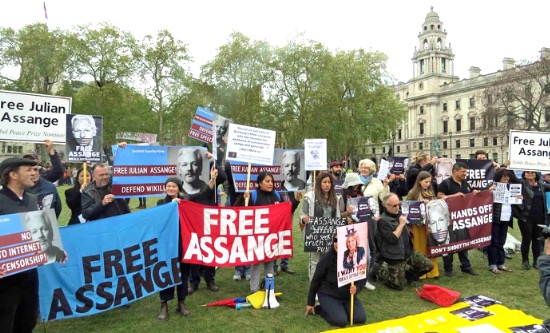
After a lengthy extradition hearing, a British court ruled that Julian Assange must not be extradited to the US, where he would have faced 18 charges of espionage relating to the publication of classified documents on WikiLeaks, which exposed US war crimes. Although this ruling is a victory for Assange and his supporters around the world, the fight for his freedom from the British judicial system continues as he remains imprisoned at HMP Belmarsh. SEAMUS O’TUAIRISC reports.
On 4 January 2021, presiding judge Vanessa Bar-ai-tser ruled that Assange’s mental health would deteriorate under the harsh conditions of solitary confinement at a super-maximum security prison where he would be detained in the US. Baraitser stated that this could cause him ‘to commit suicide with the “single minded determination” of his autism spectrum disorder’ and blocked the extradition under Section 9 of the Extradition Act 2003, which states that a judge must discharge the defendant if their mental or physical condition means that their extradition would be oppressive.
Baraitser focused solely on Assange’s deteriorating mental health, whilst disregarding all the political arguments against extradition and the exemptions for political prisoners in the 2007 Extradition Treaty between Britain and the US, thereby downplaying the political nature of this case and the threat it posed to freedom of the press.
The US Justice Department immediately announced its intention to appeal. Assange’s legal team then filed a request to have him released pending this appeal, but in a subsequent hearing on 6 January Baraitser refused to grant bail. Clair Dobbin, a lawyer representing the US government, claimed that Assange was likely to abscond, explaining how he had gone to great lengths to avoid extradition by entering the Ecuadorian embassy in 2012, as well as how Andres Manuel Lopez Obrador, the president of Mexico, had now offered Assange asylum.
Assange’s barrister, Edward Fitz-gerald, refuted all Dobbin’s claims, explaining that the ruling not to extradite Assange ‘changes everything’ and that since his sentence for breaching bail had concluded in October 2019, he has been held at HMP Belmarsh solely on the basis of the extradition request. Fitzgerald asserted that now that this was resolved, any further detention would be oppressive, made it clear that Assange now has no reason to abscond, and elaborated that there would be no precedent for the High Court to overturn the 4 January ruling. He contended that detention at Belmarsh has continued to cause Assange’s mental health to deteriorate and that the Covid-19 pandemic – which resulted in 59 prisoners there testing positive in December alone – poses a serious threat. While Baraitser accepted that detention at Belmarsh was affecting Assange’s health, she ruled that he must remain there on the grounds that he would be likely to abscond. This is not the first time that Assange has been refused bail and while this latest ruling directly contradicts the conclusions of the 4 January verdict, it reaffirms that the British courts will continue to do the bidding of the US authorities.
The fight for Assange’s freedom is far from over and is part of the wider battle to defend independent journalism. In Britain 80% of the press, including online readership, is owned by just five conglomerates: News UK, Daily Mail Group, Reach, the Guardian Media Group and Telegraph Media Group. Many major newspapers had previously used documents published on WikiLeaks; most notably The Guardian which made extensive use of them in 2010 to enhance its reputation as a whistle-blowing publication. However, when Assange was in the dock, none of the major newspapers defended him.
We must now continue the fight to release Julian Assange. The US may have been denied the chance to effectively kill him, but we must ensure that the British prison system is not afforded the same chance. It is as yet unclear to what extent President Biden will pursue these charges against Assange, but he has previously referred to Assange as a ‘hi-tech terrorist’ and his track record indicates he will come down heavily on anyone who challenges US imperialism. Julian Assange’s case highlights the power of organising to fight for justice and that we need to continue to organise to fight back.
Fight Racism! Fight Imperialism! 280 February/March 2021




